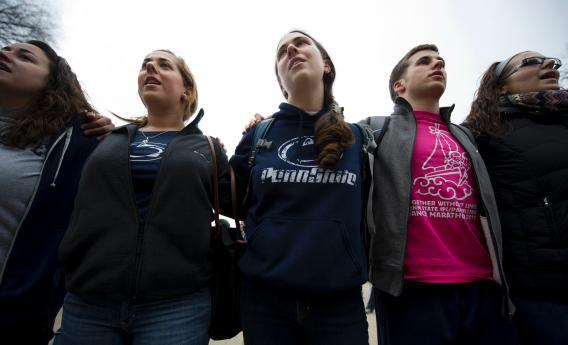When Rachel Greenstein was a senior at Occidental, the Los Angeles liberal arts college “felt like home.” So when a fellow student sexually assaulted her on campus—then applied for an RA position in one of the college’s dorms—she felt the responsibility to report him to the administration to keep her community safe. “I believed the school would be there for me,” Greenstein says. But over the course of a drawn-out adjudication process, she came to believe that the school had other priorities. After testimony from accuser, accused, and witnesses, an Occidental disciplinary panel found the student responsible for rape. He was then sentenced to ten hours of community service and required to write a ten-page report on a book about destructive masculinity by Jackson Katz. On Facebook, fellow students complained that women who report rape at Occidental are tarnishing the school’s reputation and devaluing their degrees. When Greenstein tracked down a dean to discuss the outcome of her case, Greenstein says, “she said she couldn’t remember the case, a week after she had made the decision.”
On Thursday, Greenstein teamed up with Gloria Allred and a group of other students to sue the school. According to the suit, at least 37 women were “raped, sexually assaulted, battered, harassed or retaliated against for speaking out against sexual violence” on campus. The suit also alleges that Occidental discouraged the reporting and prosecution of the crimes, failed to notify students of assaults committed on campus, and allowed students found responsible for rapes to remain in class without suspension.
It’s been a big week for Title IX, the law that requires schools to take steps to protect students from gender discrimination on campus, including in the case of sexual harassment and assault. In addition to the Occidental suit, students at Swarthmore filed a complaint against their school for similarly downplaying reports of sex crimes. And a high school cheerleader filed a Title IX suit against her Michigan school after she and another girl were assaulted by a “star member of the high school basketball team,” an event she says her school brushed aside in an effort to protect its prized athlete.
In the middle of Sexual Assault Awareness Month, students around the country are speaking out about rape on campus. And they’re not just raising awareness about the fellow students who attacked them—they’re calling out the administrators running institutions that fail to take action when they’ve been alerted to the problem. “For the entirety of my last year in college, I continued to live every day in fear,” one Occidental victim said at a press conference yesterday. “In May, I watched as my rapist shook the hand of our college’s president and received his diploma, and I wished I had not been discouraged by a dean from reporting the rape.” A Swarthmore sophomore told reporters that after “a fellow student repeatedly sexually harassed her and broke into her room in the middle of the night,” administrators “tried to dissuade her from making a formal complaint, made light of what had happened, said that she was partly to blame.” In Michigan, the National Women’s Law Center says, the principal of the cheerleader’s high school “discouraged the student and her parents from filing charges” and failed to “investigate the assault and protect the student” when she reported it to higher-ups. The victim dropped out of sports teams, spent two weeks in the counselor’s office to avoid attending class with her attacker, and ultimately transferred schools to get away. Her attacker was eventually sentenced to the county’s Adolescent Sexual Offender Treatment Program (his second appearance), but not before he assaulted another girl at the school.
In the wake of Steubenville, awareness of sexual assaults in the nation’s high schools and colleges is at an all-time high. And while it’s easy to blame these assaults on the moral failings of teenagers, the adults who are running these institutions and ostensibly leading these communities share a portion of the blame. The judge in the Steubenville case warned teenagers to watch what they say on “the social media so prevalent today,” but a lax attitude toward sexual assault isn’t an Instagram issue. The high social positions held by some of these assailants—from star athlete to RA—rely on the endorsements of adults. Fighting rape on campus will require an attitude shift among men and women as well as teen boys and girls. This month, Occidental and Swarthmore have both pledged to bring in outside experts to overhaul their sexual assault policies. It can’t come soon enough. “At this point, I’m far removed from college. I live on the other side of the country, says Greenstein, now 23. “It’s not personal anymore. I know this is going to happen to other women unless things change.”
